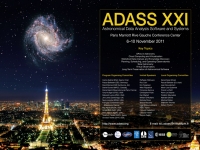Providing legacy access to astronomical data analysis software
Rik Huygen (K.U.Leuven), et al.
Abstract
Astronomical data analysis systems, especially in space projects, usually have a very long expected lifetime after the relatively short operational project phase when developer resources are available. Therefore these software projects need to take measures to make sure astronomers can continue to run the necessary mission-specific data analysis tools. Computing hardware available to astronomers tends to evolve substantially over timescales of ~10 years. Data access and data reduction of raw data are usually highly dependent on the availability of a data product archive and of the processing software. There are a number of issues that might jeopardize the legacy availability of astronomical software systems. What are e.g. potential backward compatibility issues when the core system or the language on which the software depends evolve? If a developer effort is needed to maintain the software in the long term, what are then the key software quality issues that need to be applied in order to avoid exceeding maintenance budget. We illustrate these and other issues with a case study on the Herschel Common Software System. Herschel is a cryogenic mission which has a relatively short lifetime with active software development, while the data and interactive software system will be used by astronomers for many years after the mission.Poster in PDF format
Paper ID: P060
Poster Instructions
|

